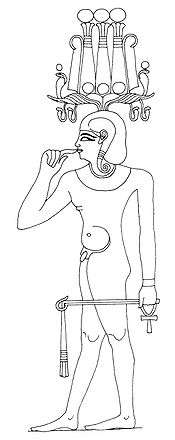Heka (god)
or | |||||||
| ḥk3w in hieroglyphs |
|---|

Heka (/ˈhɛkə/; Ancient Egyptian: wikt:ḥkꜣ(w);[1] Coptic: ϩⲓⲕ hik;[2] also transliterated Hekau) was the deification of magic and medicine[3] in ancient Egypt. The name is the Egyptian word for "magic". According to Egyptian literature (Coffin text, spell 261), Heka existed "before duality had yet come into being." The term ḥk3 was also used to refer to the practice of magical rituals.
Name
The name Heka is identical with the Egyptian word ḥk3w "magic". This hieroglyphic spelling includes the symbol for the word ka (kꜣ), the ancient Egyptian concept of the vital force.
Legend
The Old Kingdom Pyramid Texts depict ḥk3w as a threatening supernatural energy that the gods possess. The "cannibal pharaoh" must devour other gods to gain this magical power. Eventually, Heka was elevated to a deity in his own right and a cult devoted to him developed. By the Coffin Texts, Heka is said to be created at the beginning of time by the creator Atum. Later Heka is depicted as part of the tableau of the divine solar barge as a protector of Osiris capable of blinding crocodiles. Then, during the Ptolemaic dynasty, Heka's role was to proclaim the pharaoh's enthronement as a son of Isis, holding him in his arms.[4][5]
Heka also appears as part of a divine triad in Esna, capital of the Third Nome, where he is the son of ram-headed Khnum and a succession of goddesses. His mother was alternately said to be Nebetu'u (a form of Hathor), lion-headed Menhit, and the cow goddess Mehetweret, before settling on Neith, a war and mother goddess.[6]
Other deities connected with the force of ḥk3w include Hu, Sia, and Werethekau, whose name means "she who has great magic".
References
- ↑ "Projet Rosette - Dictionary detail". projetrosette.info. Retrieved 2017-09-21.
- ↑ "Coptic Dictionary Online". corpling.uis.georgetown.edu. Retrieved 2017-09-21.
- ↑ {{Cite web|url=http://www.landofpyramids.org/heka.htm%7Ctitle=Heka, god of Egypt|website=landofpyramids.org|access-date=2018-01-31}
- ↑ Hart, George (2005). The Routledge Dictionary of Egyptian Gods and Goddesses. Psychology Press. p. 66. ISBN 978-0415344951. Retrieved 22 June 2016.
- ↑ Dunand, Françoise; Zivie-Coche, Christiane (2004). Gods and Men in Egypt: 3000 BCE to 395 CE. Cornell University Press. ISBN 978-0801441653.
- ↑ Najovits, Simson R. (May 2003). Egypt, Trunk of the Tree, Vol. I: A Modern Survey of and Ancient Land. Algora Publishing. ISBN 9780875862347.